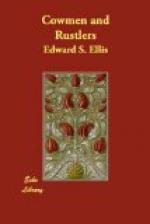CHAPTER I.
A merry group.
The Whitney household, in the western part of Maine, was filled with sunshine, merriment and delight, on a certain winter evening a few years ago.
There was the quiet, thoughtful mother, now past her prime, but with many traces of the beauty and refinement that made her the belle of the little country town until Hugh Whitney, the strong-bearded soldier, who had entered the war as private and emerged therefrom with several wounds and with the eagles of a colonel on his shoulder, carried her away from all admirers and made her his bride.
Hugh had been absent a couple of weeks in Montana and Wyoming, whither he was drawn by a yearning of many years’ standing to engage in the cattle business. He had received some tuition as a cowboy on the Llano Estacada, and the taste there acquired of the free, wild life, supplemented, doubtless, by his experience during the war, was held in restraint for a time only by his marriage.
The absence of the father was the only element lacking to make the household one of the happiest in that section of Maine; but the letter just received from him was so cheerful and affectionate that it added to the enjoyment of the family.
The two principal factors in this jollity were the twins and only children, Fred and Jennie, seventeen on their last birthday, each the picture of health, bounding spirits, love and devotion to their parents and to one another. They had been the life of the sleighing-parties and social gatherings, where the beauty of the budding Jennie attracted as much admiration as did that of her mother a score of years before, but the girl was too young to care for any of the ardent swains who were ready to wrangle for the privilege of a smile or encouraging word. Like a good and true daughter she had no secrets from her mother, and when that excellent parent said, with a meaning smile, “Wait a few years, Jennie,” the girl willingly promised to do as she wished in that as in every other respect.
Fred was home for the Christmas holidays, and brought with him Monteith Sterry, one year his senior. Sterry lived in Boston, where he and Fred Whitney were classmates and warm friends. Young Whitney had spent several Sundays with Sterry, and the latter finally accepted the invitation to visit him at his home down in Maine.
These two young men, materially aided by Jennie, speedily turned the house topsy-turvy. There was no resisting their overrunning spirits, though now and then the mother ventured on a mild protest, but the smile which always accompanied the gentle reproof betrayed the truth, that she was as happy as they in their merriment, with which she would not have interfered for the world.
That night the full, round moon shone from an unclouded sky, and the air was crisp and clear. There was not much snow on the ground, and the ice on the little river at the rear of the house was as smooth as a polished window-pane. For nearly two score miles this current, which eventually found its way into the Penobscot, wound through the leafless woods, past an occasional opening, where, perhaps, the humble cabin of some backwoodsman stood.




